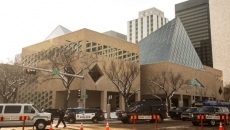First Nations chiefs have heard enough promises and "performative reconciliation," Conservative Leader Pierre Poilievre said Thursday, adding they deserve a partnership based on honest conversations.
It was the first time Poilievre was addressing the Assembly of First Nations, an organization representing more than 600 First Nations that had a tense relationship with the Conservatives when former prime minister Stephen Harper was in power.
In 2018, former Conservative leader Andrew Scheer was booed at an AFN assembly when he was unable to explain how his policies would differ from Harper's.
AFN National Chief Cindy Woodhouse Nepinak has said she wants to turn a page from that legacy, and Poilievre thanked her for inviting him to address the annual general assembly underway this week in Montreal.
Since he became leader in September 2022, Poilievre had only sent pre-recorded remarks to AFN events.
On Thursday, some chiefs appeared to like some of what the Conservative leader had to say, applauding generously during a speech that outlined his commitments to advancing economic reconciliation with First Nations and creating jobs, especially through resource development.
"We believe that economic reconciliation is part of social progress," Poilievre said. "We need jobs and opportunity for First Nations communities."
Instead of companies relying on temporary foreign workers to fill jobs, that work should go to Indigenous youth, Poilievre said.
He also said he doesn't believe in "cancelling or denying history," but rather that more stories of First Nations leaders and heroes should be taught alongside European ones.
It was a nod to disagreements Conservatives have had with decisions to remove statues or rename buildings and roads that honoured Canadians with ties to Canada's unflattering legacy of residential schools.
Poilievre ended his speech acknowledging the relationship will not be easy.
"We won't always agree and you've heard enough promises and enough performative reconciliation," he said.
"What we need are honest and direct conversations and a partnership based on a nation-to-nation relationship and mutual respect. I come here to offer that respect in total humility."
Poilievre was confronted about his priorities on Indigenous issues and the actions of Harper's government during a question-and-answer session after his remarks.
Judy Wilson, a delegate at the gathering, said it should be acknowledged that a handful of veterans and representatives from the assembly's LGBTQ+ council stood silently and turned their back on Poilievre while he spoke.
She then told Poilievre that he did not mention the issue of murdered and missing Indigenous women or the United Nations Declaration on the Rights of Indigenous Peoples, as well as inherent rights, during the speech.
Harper's government declined to call a national inquiry into murdered and missing Indigenous women and girls, but Prime Minister Justin Trudeau did, coming to power in 2015 on a promise to establish a better relationship with Indigenous Peoples.
"You also failed to recognize our residential school survivors," Wilson told Poilievre.
"If you're working to be the next prime minister in Canada, it tells me you have a lot of education to do in those fronts."
In his speech, Poilievre said it was the former Conservative government that delivered the historic 2008 apology on behalf of Canada for forcing thousands of First Nations, Métis and Inuit children to attend the government-funded church-run schools.
He did not mention the personal apology he had to make the day after that.
Hours before Harper issued the residential schools apology, Poilievre had told a radio station he questioned the value of compensating residential school survivors, instead of pushing the values of "hard work and independence."
On Thursday, Poilievre said Conservatives will work to redress historic discrimination in the child-welfare system and resolve "other outstanding issues," which Wilson and Mary Teegee, a child-welfare advocate, raised during the question-and-answer period.
The AFN and the government reached a historic deal to reform child welfare this week.
That came after more than 17 years after the organization, along with the First Nations Child and Family Caring Society, initiated a human-rights complaint over chronic government underfunding of child welfare services on reserves.
The Harper government was heavily criticized for fighting that complaint in court for years.
In turn, the Liberals have faced criticism for failing to act to implement orders made by the Canadian Human Rights Tribunal after its finding that First Nations children were discriminated against.






